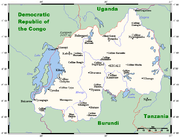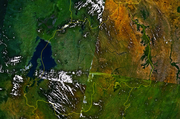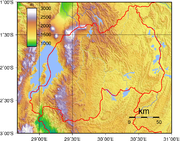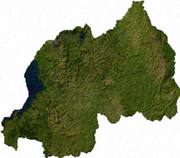
Geography of Rwanda
Did you know...
This selection is made for schools by a children's charity read more. With SOS Children you can choose to sponsor children in over a hundred countries
Rwanda is a landlocked country located in Central Africa, to the east of the Democratic Republic of the Congo. Its countryside consists of grasslands and rolling hills, and it has a temperate climate.
Political geography
Rwanda borders Burundi for 290 km, the Democratic Republic of the Congo for 217 km, Tanzania for 217 km, and Uganda for 169 km.
Physical geography
Rwanda has an area of 26 thousands square kilometers, of which 3 percent is water.
Terrain
Rwanda's countryside is covered by grasslands and small farms extending over rolling hills, with areas of rugged mountains that extend southeast from a chain of volcanoes in the northwest. The divide between the Congo and Nile drainage systems extends from north to south through western Rwanda at an average elevation of almost 2 750 m. On the western slopes of this ridgeline, the land slopes abruptly toward Lake Kivu, one of the Great Lakes, and the Ruzizi River valley, which form the western boundary with the Democratic Republic of the Congo (formerly Zaire) and constitute part of the Great Rift Valley. The eastern slopes are more moderate, with rolling hills extending across central uplands at gradually reducing altitudes, to the plains, swamps, and lakes of the eastern border region.
The lowest point in Rwanda is the Ruzizi River, at 950 m, and the highest is Mount Karisimbi, at 4,507 m.
Climate
Although Rwanda is located only two degrees south of the equator, Rwanda's high elevation makes the climate temperate. The average daily temperature near Lake Kivu, at an altitude of 4,800 feet (1,463 m) is 73 °F (22.8 °C). During the two rainy seasons (February-May and September-December), heavy downpours occur almost daily, alternating with sunny weather. Annual rainfall averages 800 mm (31.5 in) but is generally heavier in the western and northwestern mountains than in the eastern savannas.
Environment
Natural hazards in Rwanda include periodic droughts and the volcanic activity of the Virunga Mountains, located in the northwest of the country, along the border with the Democratic Republic of the Congo.
Current issues
Current issues concerning the environment in Rwanda include: the result of uncontrolled deforestation for fuel, overgrazing, soil exhaustion and widespread poaching.
International agreements
Rwanda is a party to the following international agreements:
- Biodiversity
- Climate Change
- Desertification
- Endangered Species
- Nuclear Test Ban
Rwanda has signed, but not ratified the United Nations Convention on the Law of the Sea.




